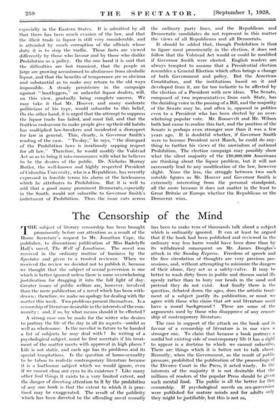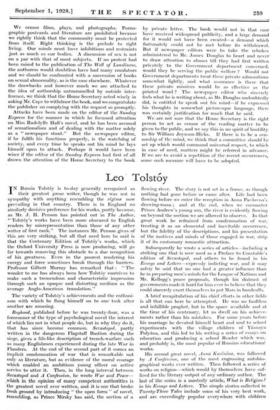The Censorship of the Mind
THE subject of literary censorship has been brought prominently before our attention as a result of the Home Secretary's request to Mr. Jonathan Cape, the publisher, to discontinue publication of Miss Radclyffe Hall's novel, The Well of Loneliness. The novel was received in the ordinary routine of business by the Spectator and given to a trusted reviewer. When we received the review we decided not to publish it, because we thought that the subject of sexual perversion is one which is better ignored unless there is some overwhelming justification for dragging it into the full light of day. Greater issues of public welfare are, however, involved than the mere publication of a novel which has been with- drawn ; therefore, we make no apology for dealing with the matter this week. Two problems present themselves. Is a censorship of literature desirable in the interests of the com- munity ; and, if so, by what means should it be effected ?
A strong case can be made for the writer who desires to portray the life of the day in all its aspects—sordid as well as wholesome. Is the novelist in future to be handed a list of subjects lie may deal with ? In writing of a psychological subject, must he first ascertain if his treat- ment of the matter meets with approval in high places ? Life is not static, and each age has its problems and its special temptations. Is the question of homo-sexuality to be taboo to realistic contemporary literature because it is a loathsome subject which we would ignore, even if we cannot close our eyes to its existence ? Like many other foul things it exists to a very limited extent, and the danger of directing attention to it by the prohibition of any one book is that the extent to which it is prac- tised may be exaggerated. The result of the publicity which has been directed to the offending novel recently has been to make tens of thousands talk about a subject which is ordinarily ignored. It can at least be argued that if the book had been published and reviewed in the ordinary way less harm would have been done than by its withdrawal consequent on Mr. James Douglas's attack in the Sunday Express. Freedom of speech and the free circulation of thoughts are very precious pos- sessions, and, without attempting to minimize the dangers of their abuse, they act as a safety-valve. It may be better to wash dirty linen in public and discuss social ills openly rather than to bury our heads in the sand and pretend they do not exist. And finally there is the question, debated down the ages, does the artistic treat- ment of a subject justify its publication, or must we agree with those who claim that art and literature must have a moral background ? These are some of the arguments used by those who disapprove of any censor- ship of contemporary literature.
The case in support of the attack on the book and in favour of a censorship of literature is in our view a stronger one. To claim that because a book portrays a sordid but existing side of contemporary life it has a right to appear is a doctrine to which we cannot subscribe. There are things which it is better not to talk about. Recently, when the Government, as the result of public pressure, prohibited the publication of the proceedings of the Divorce Court in the Press, it acted wisely. In the interests of the majority it is not desirable that the millions of readers of the popular Press should be given such mental food. The public is all the better for this censorship. If psychological novels on sex-perversion were published for mature minds and for adults only they might be justifiable, but this is not so. We censor films, plays, and photographs. Porno- graphic postcards and literature are prohibited because we rightly think that the community must be protected from itself. Right thinking is the prelude to right living. Our minds must have inhibitions and restraints just as much as our bodies. A discussion of sex is not on a par with that of most subjects. If no protest had been raised to the publication of The Well of Loneliness, the authoress would doubtless have had many emulators and we should be confronted with a succession of books on sexual abnormality, as is the case elsewhere. Whatever the drawbacks and however much we are attached to the idea of authorship untrammelled by outside inter- ference, we think that the Home Secretary acted wisely in asking Mr. Cape to withdraw the book, and we congratulate the publisher on complying with the request so promptly.
Attacks have been made on the editor of the Sunday Express for the manner in which he focussed attention on Miss Radclyffe Hall's novel, and he has been accused of sensationalism and of dealing with the matter solely as a " newspaper stunt." But the newspaper editor, if he fulfils his functions properly, is the watchdog of society, and every time he speaks out his mind he lays himself open to attack. Perhaps it would have been wiser if the editor of the Sunday Express had first of all drawn the attention of the Home Secretary to the book by private letter. The book would not in that case have received widespread publicity, and a large demand -for it would not have been created—a demand which fortunately could not be met before its withdrawal. But if newspaper editors were to take the rebukes administered to Mr. James Douglas to heart and never to draw attention to abuses till they had first written privately to the Government department concerned, would they be serving the public welfare ? Would not Government departments treat these private admonitions somewhat lightly, and what assurance is there that these private missives would be as effective as the printed word ? The newspaper editor who sincerely feels what he is writing about, as Mr. Douglas undoubtedly did, is entitled to speak out his mind—if lie expressed his thoughts in somewhat picturesque language, there was certainly justification for much that he said.
We.are not sure that the Home Secretary is the right person to act as censor of the reading matter to be given to the public, and we say this in no spirit of hostility to Sir William Joynson-Hicks. If there is to be a cen- sorship of the mind, we think that a committee should be set up which would command universal respect, to which in case of need, matters might be referred in advance. If we are to avoid a repetition of the recent occurrences, • some such measure will have to be adopted.































 Previous page
Previous page